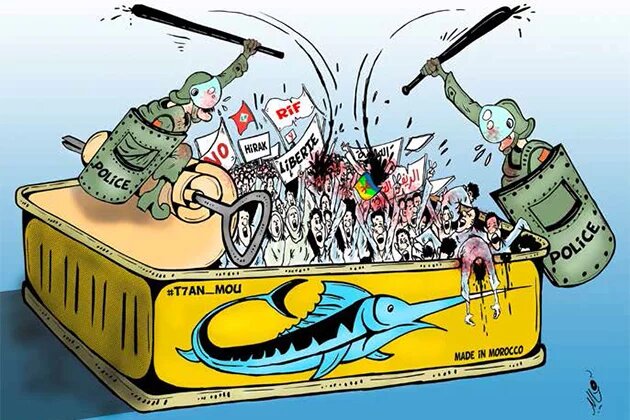The swift escalation of violence in Morocco following the tragic death of Mouchine Fikri, a fish seller in the city of al-Hoceima, shows that there’s more to food than meets the eye. For Fikri, it was an attempt to provide for his family, and for editorial cartoonist Khalid Gueddar it represents a broader public mobilisation in pursuit of civil liberties, social justice and equality, one born out of, and fuelled by, the violence meted out by public authorities.

In October 2016, in the city of al-Hoceima, police authorities confiscated a catch of swordfish fished out-of-season, and proceeded to dispose of it in a rubbish truck. In an attempt to retrieve some of the fish, Mouchine Fikri, a 31 year-old fishmonger was killed in the compactor of the truck. Police officials present at the time of the tragedy were accused of murder and, as a consequence, protests broke out across Morocco, beginning in al-Hoceima. Following police investigations, three employees from the Department of Maritime Fishing, two from the rubbish collection company and one of Fikri’s colleagues were recently found guilty and sentenced to imprisonment.
Footage of Mouchine Fikri’s death spread quickly in the media and rapidly came to symbolize the wider system of oppression and reproduction of injustice and socio-economic inequalities. Demonstrations against the manner of his death promptly called for radical changes in the situation of the Rif and throughout Morocco. Many see this moment as the birth of the Popular Movement referred to in Arabic as ‘al-Hirak al-Shaabi’ and commonly known as ‘Hirak’. A movement that since October 2016 has been protesting against the omnipresent abuse and humiliation ‘hogra’ inflicted by the government apparatus on locals and the unaccountable power of the Monarchy ,,makhzen’. The protestor’s demands relate to a broad set of social, economic and political grievances, calling for an end to Morocco’s deeply-rooted social inequalities.
What started as a statement of solidarity for the tragic death of a fishmonger swiftly turned into a broader expression of the unrest that lies at the heart of Moroccan society. Mainly peaceful protests have been interspersed with violent clashes and many protesters have been imprisoned. Following the ousting of seven Ministers from the newly formed government, an acceleration of the 6.5 billion-dirham development project for al-Hoceima was announced. On the 29th May, the leader of the movement, Nasser Zefzafi, was arrested after he interrupted the prayer of an Imam in a mosque in al-Hoceima; he was accused of obstructing freedom of worship and disturbing the public order. Nevertheless, demonstrations continue in smaller cities as well as in the major ones. Although the presence of security forces in the Rif appears to be decreasing, there are still instances of violent repression, for example, the sit-in on the 9th July in solidarity with Hirak’s detainees in Rabat.